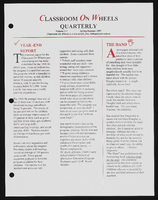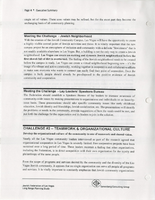Search the Special Collections and Archives Portal
Search Results

Transcript of interview with Richard Caldwell by Lloyd Henderson, March 06, 1980
Date
Archival Collection
Description
Text
Liliam Lujan Hickey Papers
Identifier
Abstract
The Liliam Lujan Hickey Papers (1940-2010) contain assorted newspaper and magazine articles, books, a transcript of her oral history interview, photographs, correspondence, and awards related to education in Nevada. The papers also document her work with the Latin Chamber of Commerce.
Archival Collection
Carl Esteban oral history interview
Identifier
Abstract
Oral history interview with Carl Esteban conducted by William Bailey on December 2, 2022 for the Reflections: the Las Vegas Asian American and Pacific Islander Oral History Project. In this interview, Esteban recalls growing up in Salinas, California in a predominantly Asian community before relocating with family to Las Vegas, Nevada in 2002. As a first generation Filipino America, Esteban's mother sacrificed her life in the Philippines to become the sole person in her family to immigrate to America. Esteban received his degree in Special Education and is currently pursuing to a master's degree in the same field. Esteban is currently a special education educator at the Yvonne Atkinson-Gates Center in North Las Vegas. Throughout the interview, Esteban discusses a wide range of topics spanning from his family migration story, his early childhood, his Filipino identity, Asian stereotypes as the model minority, and how his mentors helped shape him into the person he is today.
Archival Collection

Anita Tijerina Revilla oral history interview: transcript
Date
Archival Collection
Description
Oral history interview with Anita Tijerina Revilla conducted by Marcela Rodriguez-Campo on October 09, 2018 for the Latinx Voices of Southern Nevada Oral History Project. In this interview, Revilla discusses her early life in San Antonio, Texas. She talks about her decision to make education a priority, figuring out the college application process on her own, and her initial interest in social justice. Revilla talks about how her critical consciousness was developed, and her pedagogical approach to teaching. Revilla describes her role in the 2006 May Day march, advocating advocating for the queer community, and disrupting oppressive systems to increase educational access for students. Lastly, Revilla discusses ethnic studies and the history of inequality in the United States.
Text

Transcript of interview with Fred Gibson by Maisie Gibson, March 9, 1975
Date
Archival Collection
Description
On March 9, 1975, Maisie Gibson interviewed Fred Gibson (born 1927 in Golden, Colorado) about his life in Nevada. Gibson first talks about his family’s background, their move to Nevada, and his education in early Las Vegas schools. He also mentions his service in the U.S. Army, his college education, and his occupation as an engineer at various companies. Gibson then talks about the various locations at which he has lived, his membership in clubs and charitable organizations, and his memories of the first properties on Fremont Street as well as those of the Helldorado Parade. The interview then covers the topics of mining, the atomic testing, economic and environmental changes, and social changes. The interview concludes with a discussion on the growth and development of Henderson, Nevada.
Text

Transcript of interview with Ann K. Johnson by Wanda Cortés, March 3, 1980
Date
Archival Collection
Description
On March 3, 1980, Wanda Cortés interviewed University of Nevada, Las Vegas counselor, Ann K. Johnson (born August 28th, 1954 in Garland, Arkansas) about her life in Southern Nevada. The two discuss Johnson’s educational and occupational history. The interview concludes with a discussion on the population’s rapid growth during the seventies.
Text

Harold McKay interview, March 13, 1981: transcript
Date
Archival Collection
Description
On March 13, 1981, Dana Jamerson interviewed Harold McKay (b. July 27th, 1903 in Dresden, Kansas) about his life as a teacher in Las Vegas, Nevada. McKay speaks about his education, his move from Chicago, Illinois to Las Vegas and how he began his career in education. McKay focuses on how and why he founded the Teacher’s Credit Union, his time working in administration and his business school, as well as the problems related to segregation and integration in the educational system. Lastly, he talks about the growth of the gaming and entertainment industry in Las Vegas, and his volunteer work with the Senior Citizen Center.
Text

Classroom on Wheels fliers
Date
Archival Collection
Description
From the Alpha Kappa Alpha Sorority, Incorporated, Theta Theta Omega Chapter Records (MS-01014) -- Chapter records file.
Text

Jewish Federation of Las Vegas long-range planning study, 2000
Date
Archival Collection
Description
Long-range planning study conducted and prepared by the Levenberg Consulting Group regarding the Jewish community of Las Vegas with particular attention to Jewish elderly, the economically disadvantaged, young adults, and Jewish education at all ages.
Text

Mauricia Baca interview, December 16, 2019: transcript
Date
Archival Collection
Description
Interviewed by Elsa Lopez and Claytee White. Mauricia Baca, Director of Get Outdoors Nevada, was born to a Jewish American mother and Mexican father who settled in New York City. She overcame the economic obstacles of her early life to graduate from Vassar College and University of New York Law School, where she learned to be proud of her identity. Subjects: Jewish, Education, Law School, Latinx, Mexican
Text
